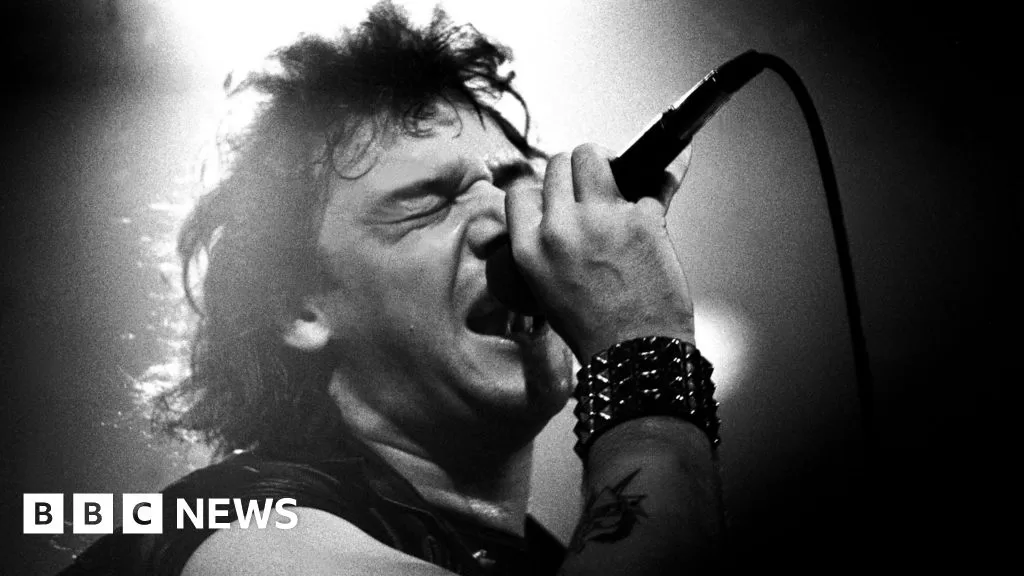Paul Di’Anno, the original singer for heavy metal band Iron Maiden, has died at the age of 66.
Born Paul Andrews, the musician featured on the band’s first two albums, Iron Maiden and Killers, establishing them as a crucial part of the new wave of British heavy metal.
He left the band in 1981 and was replaced by Bruce Dickinson. Di’Anno later admitted he had been partying “non-stop, 24 hours a day” and that the impact of his lifestyle “wasn’t fair to the band, the fans or to myself“.
However, he had a long and eventful recording career with groups such as Battlezone and Killers, and had spent this summer touring European rock festivals.
His death was announced by record label Conquest Music, on behalf of his family.
In a statement, they said Di’Anno had “passed away at his home in Salisbury”. No cause of death was given.
“Conquest Music are proud to have had Paul Di’Anno in our artist family and ask his legion of fans to raise a glass in his memory,” they added.
Born in Chingford, east London, in 1958, Di’Anno sang with numerous bands as a teenager, while working as a butcher and a chef.
In 1977, he befriended bass player Steve Harris, who was seeking a singer for his up-and-coming metal band Iron Maiden. Di’Anno auditioned and got the job.
Their sound was an anomaly during the ascendancy of punk rock, and they struggled to get gigs outside London. To address the issue, they decided to make a demo tape to drum up business.
Known as the Soundhouse Tapes, the three-track demo gained them a cult following, selling 5,000 copies by mail order.
By 1979, they had secured a record deal with EMI and started recording their self-titled debut.
Although it was put together in a hurry, the record was hugely influential – with its combination of punk intensity and rock riffs setting the template for heavy metal in the 1980s.
It entered the UK album chart at number four in April 1980, and the success of the single Running Free earned the band a coveted spot of music TV show Top of the Pops.
The follow-up album, 1981’s Killers, had a harder sound again. But after a world tour, Di’Anno was either kicked out of the band or left of his own accord.
Either way, he said success had led him to a dark place.
“I was already a fairly excessive character, but there I really went for it,” he told Rock Hard magazine in 2004.
“I was on another planet, as well as the rest of the band.”
With Dickinson taking over, Iron Maiden went on to become one of rock’s most successful groups, with genre-defining hits like Run To The Hills and Can I Play With Madness.
But Di’Anno never held a grudge against the band, or his replacement.
“Everyone thinks that we hated each other, which is [completely wrong],” he told SDTV in an interview last month. “That’s the press for you.”
He also denied rumours that he had been underpaid for his contribution to the first two Iron Maiden albums, which included co-writing credits on key tracks like Remember Tomorrow, Killers, Sanctuary and Running Free.
“To be honest with you, it’s nobody’s damn business [but] I got paid very well,” he told Rock Hard in 2022.
“They looked after me. End of story.”
After leaving Iron Maiden, Di’Anno’s raw, aggressive vocals were cited as an influence by metal bands including Metallica, Pantera and Sepultura.
He stayed in music, both a solo artist and as a member of bands like Gogmagog, Battlezone, Praying Mantis, and Killers.
In recent years, he had been performing in a wheelchair due to serious health issues including lymphedema, a condition that causes swelling of your body tissue. In 2022, fans helped him raise money to have major knee surgery in Croatia.
Despite that, he kept up a robust touring schedule, playing more than 100 shows in 2023 and 2024.
A career retrospective album, The Book of the Beast, was released last month, including highlights from his solo career and two “reworked” versions of Iron Maiden songs Tomorrow and Wrathchild.
A documentary about his life is scheduled for release at the end of the year.
